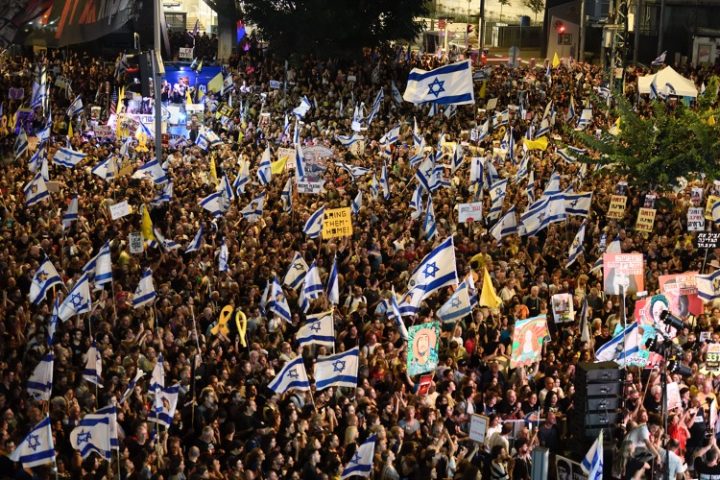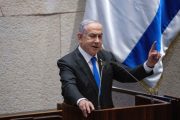
Massive protests have swept across Israel after six more hostages were found dead in Gaza. The protestors demanded that Prime Minister Benjamin Netanyahu reach a cease-fire with Hamas to bring the remaining captives home. This massive demonstration that started late Sunday and continued into Tuesday is reportedly the largest in 11 months of conflict.
The protests come amid growing frustration with Netanyahu’s handling of the offensive on Gaza and his unwillingness to agree to a ceasefire. According to Associated Press, a majority of Israelis favor a deal that would end hostilities and secure the release of hostages, as reflected in recent polls. However, Netanyahu remains committed to his strategy of “total victory” against Hamas, a stance that continues to receive significant support from certain segments of the population.
Protests
As reported by the Times of Israel, organizers estimated that 300,000 people gathered in Tel Aviv, with an additional 200,000 participating in protests across the country. The firm Crowd Solutions put the number at around 280,000 for the Tel Aviv demonstration.
The protest was triggered by the news of the discovery of the bodies of six Israeli hostages, including Israeli-American Hersh Goldberg-Polin, murdered in a tunnel in Gaza’s southern city of Rafah. According to the Time report,
The details of their deaths shocked the country to the core. All six were killed just hours before Israeli soldiers found their bodies. The army said each died by multiple gunshot wounds to the head, apparently by execution.
Late Monday, several thousand demonstrators gathered outside Netanyahu’s private residence, chanting, “Deal. Now,” as reported by Associated Press. According to the outlet, the families of the killed hostages have blamed Netanyahu, arguing that their loved ones could have been saved through a deal with Hamas.
The main organizer of the protests, the Hostages and Missing Families Forum, an organization established by families of Israelis who were abducted by Hamas during the October 7 attack on Israel, called on the people to “Bring the Nation to a Halt” by continuing to “fight alongside them for a deal to bring all hostages home.”
Haaretz, one of Israel’s oldest and most influential daily newspapers known for its critical in-depth reporting, has been supportive of the protest, arguing that the people “must talk to the government in the only language it understands: force.”
The outlet also called on the public to evaluate “Israel’s self-image and the value it places on human life” while accusing the government of making the “deliberate decision to sacrifice the lives of the hostages.”
General Strike
Adding to the pressure on Netanyahu’s government, Israel’s largest trade union, the Histadrut, called for a general strike on Sunday. This strike was expected to disrupt major sectors of the economy, including banking, healthcare, and operations at the country’s main airport, Ben Gurion.
The union’s chief, Arnon Bar-David, said that “a [hostage] deal is more important than anything else,” according to the Times of Israel.
The report continues,
“It is impossible to stand idly by in the face of the cries of our children who are being murdered in the tunnels in Gaza. It is unacceptable,” he declared after meeting with representatives of the Hostages and Missing Families Forum — which earlier Sunday called on the public ‘to join a massive demonstration, demanding a complete shutdown of the country’ and appealed to the powerful Histadrut to stage a mass strike.
“Israel’s social, financial, and municipality leadership voices the people’s demand: Seal the deal now!” posted the Forum.
The Israel Business Forum, a prominent organization that represents leaders from the 200 largest companies in Israel, covering a wide range of industries including banking, insurance, technology, retail, and energy, announced its support for the families of Israeli hostages held in Gaza and urged the public to join in their call for action.
The strike was supported by several municipalities, a teachers’ union, and medical organizations such as The White Coats, as reported by the Times of Israel, while numerous other organizations and localities condemned the strikes as “playing into hands of Hamas.”
Hamas
Hamas blamed the deaths of the hostages on Israel and the United States, accusing them of constantly imposing new conditions for a deal, including a demand for Israel to maintain control over Philadelphi corridor, a narrow buffer zone along Gaza’s southern border with Egypt.
Khalil al-Hayya, a member of Hamas’s political bureau, said, according to BBC, “The six hostages, along with others, could have been reunited with their families through a genuine exchange deal while they were still alive. However, the insistence of the occupation army, Netanyahu, and his extremist government is the reason these individuals lost their lives.”
Another official, Izzat al-Rishq, quoted by Associated Press, added that “the hostages would still be alive if Israel had accepted a U.S.-backed cease-fire proposal that Hamas said it had agreed to in July.”
Netanyahu
In his address to the nation on Sunday, Prime Minister Netanyahu vowed that Hamas leaders will “pay the price” for murdering the hostages.
“Whoever murders hostages — does not want a deal,” he added, accusing Hamas of “[steadfastly] refusing all proposals.” Netanyahu also said that Israelis are facing “a brutal enemy who wants to murder us all.”
In the latest round of talks, Netanyahu is focusing on controlling the Philadelphi corridor, arguing that this is essential to prevent Hamas from rearming through smuggling tunnels, which he describes as “the oxygen of Hamas.”
According to the Associated Press report,
On Monday, [Netanyahu] said he is ready to carry out the first phase of the cease-fire — a plan that would include the release of some hostages, a partial pullout of Israeli troops and the release of some prisoners held by Israel. But he rejected a full withdrawal from Gaza, saying he saw no other party that could control Gaza’s borders.”
However, Netanyahu’s insistence on this point has been met with significant criticism. Many argue that Netanyahu’s focus on the corridor, rather than prioritizing the safe return of hostages, shows a disregard for the immediate humanitarian needs and undermines potential diplomatic solutions. Critics also highlight that Egypt and Hamas have denied the existence of such smuggling activities, questioning the validity of Netanyahu’s justification for continued military action.
Dehumanizing Palestinians?
While the world mourned the murdered Israeli hostages, some journalists highlighted the broader context of this bloody conflict. They emphasized that while these deaths are undeniably tragic, they are not the only casualties, pointing out that Israel continues to detain and mistreat thousands of Palestinian prisoners. Independent journalist Caitlin Johnstone, among others, urged Western audiences to reject a worldview that dehumanizes Palestinians, calling for greater empathy and understanding for all victims of the conflict.
“Western government officials are making it clear that they do not see Palestinians as human in the same way they see Israelis as human, as are the mass media propaganda institutions who’ve been covering the deaths of these hostages with an intensity never seen regarding the IDF’s daily massacres of civilians in Gaza,” she wrote.
According to B’Tselem, the Israeli Information Center for Human Rights in the Occupied Territories, as of June 2024, the Israel Prison Service (IPS) was holding 9,440 Palestinians in detention, including 1,761 from the Gaza Strip.
As of mid-August, since the beginning of the Israel operation against Hamas following the October 7 attack, more than 40,000 Palestinians have been killed in Gaza, according to the territory’s health ministry. The figures have been accepted as “generally accurate” by Israeli intelligence services.




